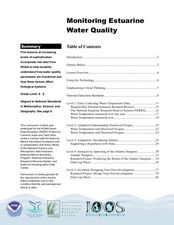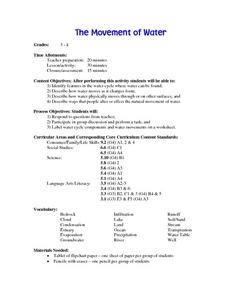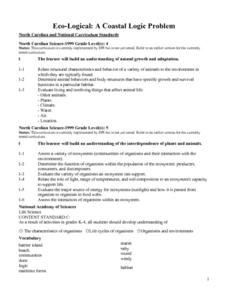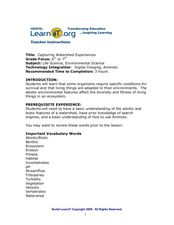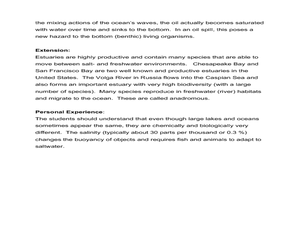Curated OER
Monitoring Estuarine Water Quality
Students analyze water quality data from real data. In this environmental science instructional activity, students examine how salinity and dissolved oxygen affect the living organisms in the estuary. They interpret graphs to support or...
Curated OER
Introduction to the Barnegat Bay Estuary
Students research estuaries. In this estuaries lesson, students discuss the differences in a bay and an ocean. Students watch a PowerPoint of the properties of the estuaries and geography of Barnegat Bay. Students complete a worksheet...
Curated OER
The Movement of Water
Here is an excellent lesson plan on the water cycle and the states in which water exists. Learners identify the features of the water cycle, describe how water changes form, and look at ways that people affect the natural movement of...
Curated OER
Pond Ecosystem Field Trip
Students investigate the environment by participating in a class trip. In this pond ecosystem instructional activity, students define a list of vocabulary terms associated with ponds such as invertebrate and metamorphosis. Students...
Curated OER
Interpreting Paleoenvironments With Microfossils
Students gain a better understanding of how scientists can use foraminifera to interpret past environments. Specifically, students have the opportunity to explain one of the basic tenets of geology - the present is the key to the past.
Curated OER
Salt Marsh in a Pan
Students create a model of a salt marsh to discover the impact of pollution and human activities on water-based habitats including bays and the ocean. They recognize the relationship between natural and developed areas. Students impact...
Curated OER
Save the Bay!
Students explore environmental protection by creating a presentation in class. In this Chesapeake Bay activity, students discuss the current threats from human beings towards the delicate balance of life near the bay. Students identify...
NOAA
Deep-Sea Ecosystems – Chemosynthesis for the Classroom
Photosynthesis was discovered in the 1770s, but chemosynthesis wasn't discovered until 1977. While many have performed an experiment to show how photosynthesis works, the activity allows pupils to observe chemosynthesis. Scholars set up...
Curated OER
Eco-Logical: A Coastal Logic Problem
Fourth graders study the characteristics of five coastal communities. They use logic cards and matching activities to identify the proper community for plant and animal species.
Curated OER
Is the Hudson River Too Salty to Drink?
Learners explore reasons for varied salinity in bodies of water. In this geographical inquiry lesson, students use a variety of visual and written information including maps, data tables, and graphs, to form a hypothesis as to why the...
Curated OER
Capturing Watershed Experiences
Students observe organisms found in the water. In this instructional activity on organisms, students collect water from local streams and tributaries in order to study the organisms found in the water. As a culminating activity, students...
Curated OER
Teacher's Guide For: Water Temperature and Salinity Experiment
Learners experiment with water density, temperature and salinity. For this water lesson, students observe how the coldest water sinks to the bottom of a test tube, and how saltwater sinks in comparison to freshwater.


